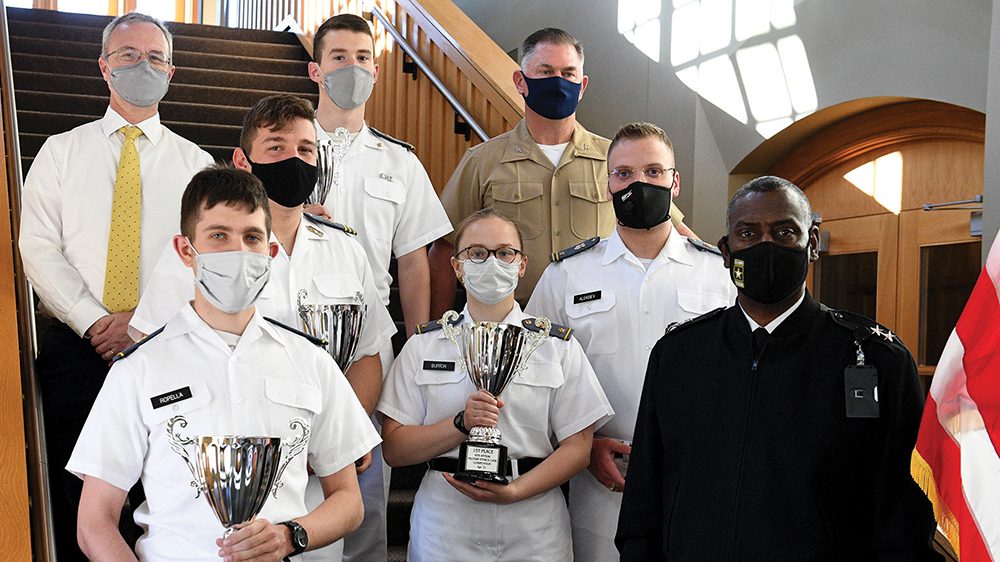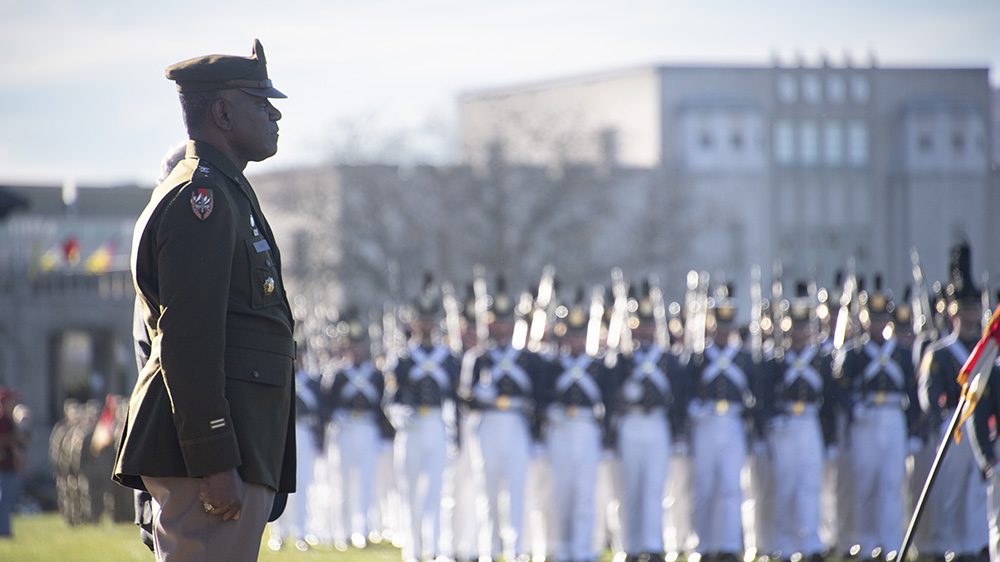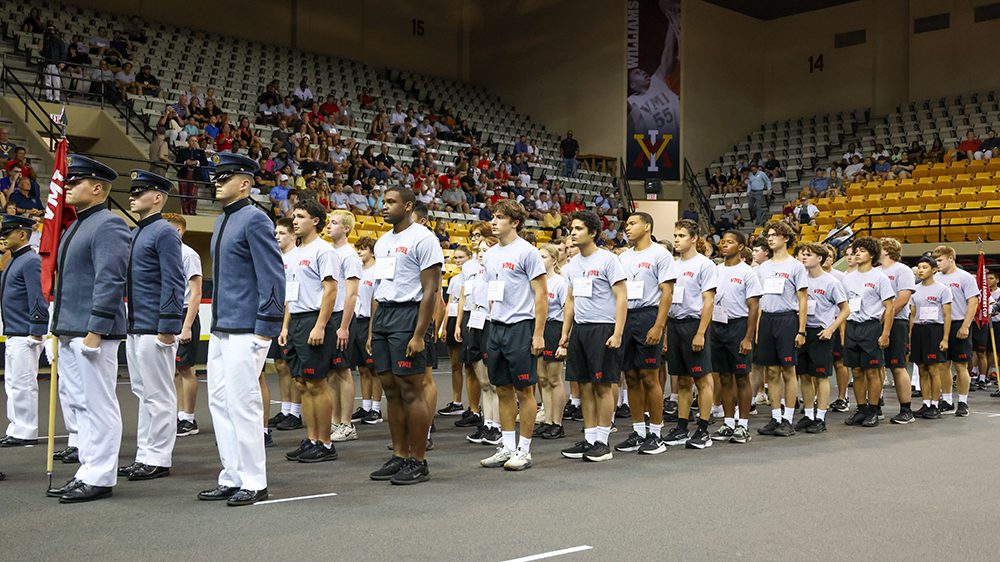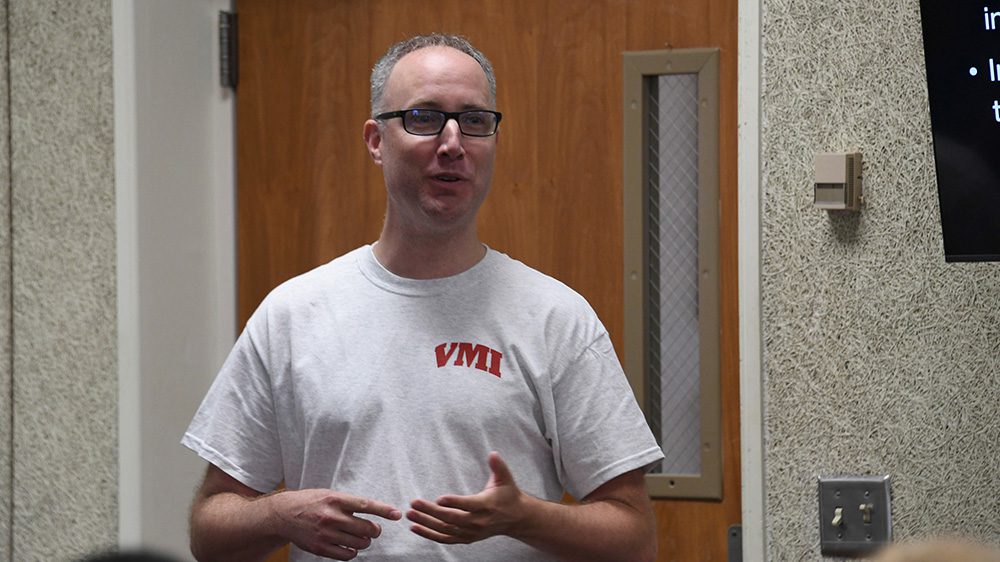On April 24, 2021, VMI’s ethics team turned in its first-ever win, defeating three of the five federal service academies: The U.S. Naval Academy, the U.S. Air Force Academy, and the U.S. Military Academy—at the 2021 Military Ethics Case Competition, hosted by the Vice Admiral James B. Stockdale Center for Ethical Leadership at USNA. This year’s Keydet team was led by Benjamin Ashmore ’21, cadet in charge. The team was unable to travel to the Naval Academy due to COVID-19 precautions and participated via Google Meet with a pre-recorded presentation followed by a round of live judging. Retired armed forces personnel comprised the judges’ panel. After each pre-recorded presentation, the judges would confer off camera for about 10 minutes and had 10 minutes to question each team. Each team watched the others present.
The groups from VMI and the U.S. Military Academy presented ethical arguments on the same case study: The sentencing of Beaudry Robert “Bowe” Bergdahl, a U.S. Army soldier who deserted his post in June 2009 and was subsequently captured, held, and tortured by the Taliban until 2014, when the U.S. arranged for a prisoner exchange.
The task was to determine whether or not leniency was appropriate in the chosen case. The original prosecution suggested jail time for Bergdahl, but due to his time spent as a POW in Afghanistan, the judge ruled against it. Bergdahl was dishonorably discharged from the U.S. Army in 2017. For its ethical argument, the VMI team argued against the judges’ decision, concluding that leniency was not appropriate and that Bergdahl should have served prison time for his violations of Articles 85 and 99 of the Uniform Code of Military Justice. They recommended Bergdahl complete all 14 years, less the five years of his captivity and the two years spent while at trial. They also upheld his original punishment of a $10,000 fine, reduction in rank to E-1, and dishonorable discharge, plus the completion of the remaining seven years of his prison sentence.
“The key for our strategy was looking at his decision to desert his post objectively and drilling down into the pure ethics of the case itself,” said Ashmore. While the team understood the reasoning for the judge’s original ruling in the case, they argued Bergdahl’s decision to desert his post was made with a sound state of mind, and he deliberately went against his obligations and duty as a U.S. soldier. The judges felt the VMI team provided the best ethical, legal, and leadership arguments on the case in the initial pre-recorded presentation. The VMI team received perfect scores from two of the judges in each of the rounds of the competition. Recordings of both sessions will be posted by the Stockdale Center at a later date at www.usna.edu/ethics.
Ashmore explained that pre-recording the presentation forced team members to be much more concise in presenting their arguments. “It took us about two and a half hours to record a 30-minute presentation,” he said.
Ashmore has also tried to help next year’s team by keeping copious notes as a kind of written record to pass along. “When I came into the role, I didn’t have any documentation,” he stated. “That’s what has been so difficult for a lot of leadership roles for the 1st Class cadets. Due to COVID-19, we didn’t have the benefit of meeting with the outgoing leadership for any kind of debriefing, so I wanted to make sure there was something to hand on to the next group of leaders.”
In addition to Ashmore, the team consisted of Cadets Yavor Aleksiev ’22, Harris Burton ’23, Travis Ropella ’23, and Brandon Marks ’23. Faculty mentors for the team are Col. Patrick Looney, VMI Center for Leadership and Ethics deputy director, and Duncan Richter, Ph.D., Charles S. Luck III ’55 Institute Professor, philosophy.
The team received trophies provided by the CLE. For photos and information about CLE events, follow the VMI Center for Leadership and Ethics on social media.




